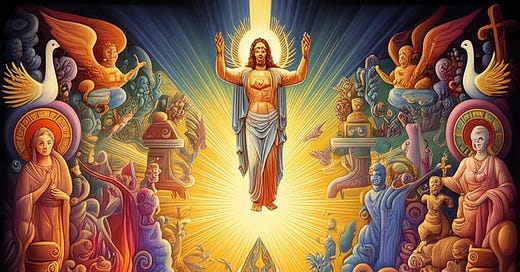Humanity did not Create Religion, it Revealed Religion Through Explaining the Unconscious
Reviewing Carl Jung's Psychology of the Unconscious Mind, Part 4: Tackling Jordan Peterson's Reading List
Carl Jung’s Psychology of the Unconscious is not something I can summarize in a short essay, so I decided to create bite-sized chunks of what I’m getting from it.
In the same way that you and I evolved to develop ten fingers and ten toes, we both evolved to have similar contents in our unconscious minds.
“primitive figures of phantasies and religious myths streaming up from the unconscious.” — pg. 455
The way Jung describes mythology and religion is as if our conscious minds are explaining, through symbols and stories, the content of our unconscious minds. We dream, have visions, and then explain those dreams and visions. We evolve those reflections on the unconscious mind from mere symbols, to stories, as we attempt to narrate these dreams and visions which produce the narratives of religious ideas.
A religion is simply a narrative that our conscious mind uses to communicate the contents of our unconscious minds. It is an advanced result of our attempts to rationalize, explain, and understand the majority of what our minds produce.
“I think belief should be replaced by understanding; then we would keep the beauty of the symbol, but still remain free from the depressing results of submission to belief. This would be the psychoanalytic cure for belief and disbelief.” — pg. 263 [Emphasis in the original]
So when I hear people say things like, “People created religion in order to…”, I can’t help but think it’s just as silly as saying, “People created fingers and toes in order to…”.
The contents of our unconscious minds are just as native and natural to the contents of our physical bodies. They are also universal in their basic forms, even if expressed using different symbols and stories based on various environments.
“Nature has first claim on man; only long afterwards does the luxury of intellect come.”
Again, here Jung explains the process by which we come to have mythology and religion. It is not our intellect that leads us, but it is our intellect that helps us to explain us.
Near the conclusion of this book, as Jung gets into the chapter on sacrifice, he naturally discusses the Passion of Christ. Here the primary idea of sacrifice that the Bible continually describes and discusses comes to its peak by describing the ultimate sacrifice; self-sacrifice.
“The comparison of the Mithraic and the Christian sacrifice plainly shows wherein lies the superiority of the Christian symbol; it is the frank admission that not only are the lower wishes to be sacrificed, but the whole personality. The Christian symbol demands complete devotion; it compels a veritable self-sacrifice to a higher purpose, while the Sacrificial Mithriacum, remaining fixed on a primitive symbolic stage, is contented with an animal sacrifice. The religious effect of these symbols must be considered as an orientation of the unconscious by means of imitation.” pg. 478 [Emphasis mine]
Not only do I find this passage critical to the ideas I’ve expressed and come away with, but it also describes the pinnacle of what the contents of our unconscious mind is trying to tell us. Jung lays out the link between religion and the unconscious as well as naming its ultimate conclusion which is the ultimate conclusion of Christianity: voluntary self-sacrifice for humanity is the ultimate good.



